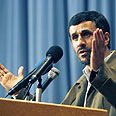
Iran, IAEA agree to discuss nuclear allegations
UN nuclear watchdog's spokeswoman says agency hopes Tehran will provide necessary clarifications about claims it tried to make nuclear arms. Ahmadinejad: Iran won't yield to international pressure to halt atomic work
Mohamed ElBaradei's, head of the UN's nuclear watchdog, said Iran's decision to discuss allegations it tried to make nuclear weapons was "a milestone."
IAEA spokeswoman Melissa Fleming says the agency hopes Iran will provide the necessary clarifications about the allegations in May.
She said Wednesday that an agreement on the issue had been reached during talks in Tehran earlier this week between Iranian officials and IAEA Deputy Director General Olli Heinonen.
Iranian President Mahmoud Ahmadinejad told a rally on Wednesday that his country was ready to discuss its nuclear program with any country but will not yield to international pressure to halt the atomic work.
Iran insists its nuclear program is aimed only at producing electricity but has so far failed to convince the West, which accuses the Islamic state of secretly trying to produce nuclear bombs.
"The Iranian nation is in favor of talks to resolve the (nuclear) issue with any of you (countries). We will slap those who want Iran to abandon its right (to nuclear technology) on the mouth," Ahmadinejad said in a televised address in the western city of Hamedan.
Ahmadinejad in March ruled out any talks with the West over Iran's disputed nuclear program, saying Iran would only discuss the issue with the UN nuclear watchdog, the IAEA.
'Our nation will preserve all its rights'
Britain, France, Germany, the United States, Russia and China want EU foreign policy chief Javier Solana to meet Iran's chief nuclear negotiator, Saeed Jalili, to try to reopen talks on offers of incentives for Iran to halt its work.
But Iran, the world's fourth-largest crude exporter, says the nuclear program aims to produce electricity so it can sell more of its oil and gas abroad.
The UN Security Council has imposed three rounds of sanctions on Tehran for not halting its sensitive nuclear activities.
An April meeting in Shanghai of the five permanent members of the UN Security Council – the United States, Russia, China, Britain and France – over how to sweeten the incentives to Tehran fell short of reaching an agreement.
Ahmadinejad insisted Tehran would reject talks with the West based on their demand for a nuclear halt in exchange for trade benefits and a halt to sanctions.
"Iran's enemies (the West) should know our nation is in favor of logical talks... but talks should be based on respecting our rights," Ahmadinejad said.
US President George W. Bush and British Prime Minister Gordon Brown vowed last week to prevent Iran from developing a nuclear bomb, possibly by expanding sanctions.
Ahmadinejad said no power in the world "would dare to violate" Iran's rights.
"They (the West) should know that our nation will preserve all its rights with logic and unity," Ahmadinejad said, as thousands of people chanted "nuclear energy is our obvious right."
Reuters and The Associated Press contributed to this report










